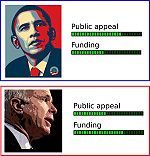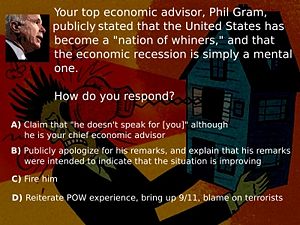ProjectProposal-AnthonyKilman
From CS 160 Fall 2008
Contents |
Individual Project Proposal: Choose Your Own Presidential Campaign
Target User Group
The target user group will be politically active American young adults who subscribe to the views held by either the Democratic or Republican national party. The demographic will likely consist of college students and young urban professionals who are knowledgeable of current political events, or at least hold an interest in politics. Additionally, this group has a desire to learn more about either their preferred or opposing candidate.
In order to make an informed decision in the upcoming election, these people must at least become familiar with policy decisions made by each candidate. Without a firm knowledge of each candidate's stance on key issues, voters are unable to make an intelligent decision come November; instead relying on media coverage and bias to fill the void.
Problem Description
Most media outlets are generally biased toward one candidate or another for the upcoming election. Additionally, widespread internet access allows information to spread quickly and efficiently, thus most members of the target user group become overwhelmed with data that is indistinguishable from fact or fiction. As a consequence, users tend to define their personal stance issues in alignment with their party line, as opposed to making decisions based on their personal opinions.
The target group demographic has also grown accustomed to immediate access of information, and infinitely many forms of entertainment. As a consequence, users of the target demographic have a relatively short attention span making it difficult to leave a lasting impression on a user.
Problem Context and Forces
With the upcoming presidential election, the target user group is likely to already be immersed in current political issues. These include topics which are discussed on television, and regularly updated blogs on the web. Although media in general (including the web) is ripe with information, two key issues arise. (1) It is difficult to verify information presented as fact, because this demographic tends to either have an extremely short attention span, or is preoccupied with prior obligations such as work, school, etc. (2) Even if facts presented could be verified as such, the user is not likely to retain such information unless they are really “gung-ho” about politics.
The target user group will likely get a majority of their information from the web, and will be somewhat limited in terms of free time. These users consist of the relatively net savvy and educated users, who are familiar with many common web interfaces such as Google, Facebook, etc. Additionally, users who obtain information through broadcast media usually supplement this information by related data on the web. As a consequence of these users either being preoccupied with school or a budding career, time is a significant constraint. So ingestion of information is usually limited to news bytes obtained through the mass media, in the form of broadcast media or web sites. One alternative solution involves integrating this information into an educational game as a form of entertainment.
Solution Sketch
A political role-playing game (RPG) can be a solution for effectively communicating information about political candidates, and impressing the nuances associated with discerning fact from political propaganda. The game itself will consist of two modes of operation: “normal” and “slander”. The last mode will likely have a humorous tone, but will demonstrate tactics used in mainstream media to distract voters from key issues. The user will be able to choose from two characters: Barack Obama, and John McCain. The user will control the decision making process of each candidate, and these decisions will affect attributes which are affiliated with each candidate. For example, the user will choose a character with a default set of attributes:
The user will then take their chosen candidate through key issues in their campaign, and decide what their character will or will not do. These issues will vary from voting on legislation to personal life decisions. The idea more or less mimics the grade-school “Choose Your Own Adventure” novels. While providing a dynamic political environment for the user, key decision points are emphasized to the player so the user must think through decisions using their own judgment which will discern the outcome of the election and (potential) presidency based on their decisions.
To facilitate implementation, the game environment will mostly be comprised of images, movies, text, and sound-bytes. Because of the intellectual nature of the game, it is difficult to use animation to convey key ideas in the game. An example of a decision point is shown below:
The choices a user can make are organized in such a way, that the first choice is the decision the candidate actually made, while the others are different paths the user may take. With this strategy, the user may explore different paths taken by each candidate, and observe the outcome based on previous decisions. The first decision will include an icon indicating that by hovering the mouse pointer over this option, the source of this piece of information will be revealed for the user to explore.


